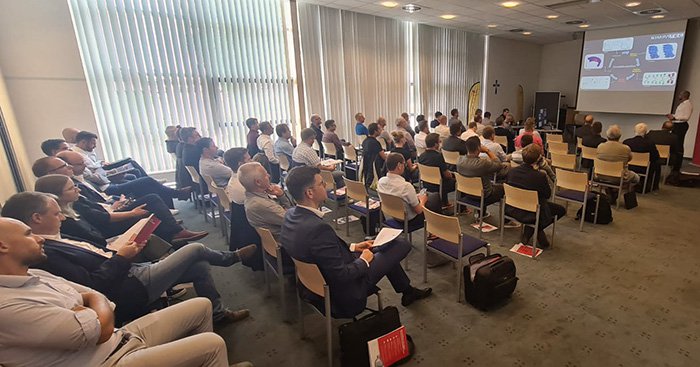
FORUM.Werkzeugbau – Digitalization at its best
Digitalization does not stop at toolmaking. The time of conventional milling machines and lathes is now a long time ago. Since then, manufacturing processes have become increasingly digital. While sensors in the tool were still a rarity a few years ago, they are now increasingly required. As a result of this development, many isolated solutions have become established. Data is generated along the entire production chain. Intelligent systems are needed to not only collect this data, but also enable it to be evaluated, analyzed and recycled for subsequent projects. Ultimately, the aim is to close the gap between the real, physical world and the virtual, digital world.
The two-day event combined presentations by top-class experts regarding topics about digitalization in toolmaking with insights into practice. A major highlight was that this event could once again be held in person. Even in the age of digitalization the personal contact is still essential. In addition to the great presentations it is also the personal conversations during the breaks that give opportunity for new forward-looking ideas and collaborations.
The presentations by Christoph Kelzenberg (Werkzeugmaschinenlabor WZL der RWTH Aachen), Ralf Dürrwächter (VDWF e.V.) and Melanie Fritsch (Marktspiegel Werkzeugbau eG) highlighted the potential offered by digitalization . In toolmaking the opportunities of digitalization have already been noticed but not much of it has been implemented yet. In order to be able to exist on the market in the future it is going to be necessary to be dealing with digitalization. That is the only way to be able to clearly stand out from cheap tools and to score points with added value and quality.
In order to be able to collect the data standards and interfaces will play an increasingly important role in the future in order to move away from isolated solutions to mature overall concepts. Georg Steinbichler (JKU / Institute for Polymer Injection Molding and Process Automation), Gerhard Würth (ARBURG GmbH + Co KG) and Alexander Schildknecht (Mold-Masters Handelsges.m.b.H) reported on which interface solutions already exist, which interfaces are currently being worked on and what challenges the future will bring. Andreas Reinthaler (Digital Moulds GmbH) showed how it is already possible today to equip a mold intelligently with sensors and to make this data available in the MES.
When one talks about digitalization one can't avoid the digital twin. The question that always arises is: "Where does the digital twin begin and where does it end? Florian Aichberger (SimpaTec GmbH) and Bernhard Radler (Schöfer GmbH) shed light on this subject. In a short overview they showed how far-reaching this topic is. It starts with data preparation and continues with process simulation to the creation of material maps based on the simulation results. If in structural mechanics it turns out that the component properties do not fit a cross-software optimization is necessary. If we now look at process simulation, we see that there is no such thing as just ONE digital twin. You need the digital design twin, the digital material twin, the digital machine twin and the digital process twin. The machine characterization carried out at Schöfer GmbH clearly demonstrated how important machine characterization is, especially in the case of very narrow process time frames.
But not only simulation plays a role in digitalization. ERP systems also play an important role in mapping the manufacturing process of the tool. Using a practical example, Christoph Wimmer (HOST Software Entwicklung und Consulting GmbH) showed how resources can be used in an agile and ideal way through intelligent planning. But other things besides planning play an increasingly important role. It is also about keeping the knowledge in the company. Markus Forro (WBI Knowledge Management), and Andreas Rucziczka (Miraplast GmbH), have introduced a digital and living knowledge database at Miraplast GmbH. Special emphasis was placed on the fact that existing data can be easily integrated into this knowledge database. If new documents are integrated into the system the persons concerned are automatically informed. For all other information a simple search function is available. Outdated or redundant documents are thus a thing of the past. To protect this data IT security is an often-forgotten topic. Martin Schiller (InnoHD GmbH) urgently draws attention to the importance of this. In the area of IT security it is also important to find an overall solution to ensure maximum protection.
But digitalization is not a development that you do once and then you're done. Digitalization is a continuous process that evolves with the current state of the company. Christian Riedl (Haidlmair GmbH) says that there is no single path to digitalization. Ideally, you start with the current biggest hurdles and work your way forward on the basis of a roadmap. This roadmap shows a view of the future. Although this picture can also change in the course of the journey.
In order to be prepared for the topic of digitalization in the future smart minds are needed that are specially trained in the subjects of digital toolmaking. Gerald Warter (KTLA - Kremstaler Technische Lehrakademie) reported on this from the KTLA. It was very pleasing that even three graduates found their way to FORUM.Werkzeugbau. In a cooperation with the professional school in Steyr and the association "Technologiegruppe Kremstal (TGK)", the first class of the apprenticeship "Digital Toolmaking Technology" has started in 2020. Another big step in the direction of digitalization around toolmaking.
